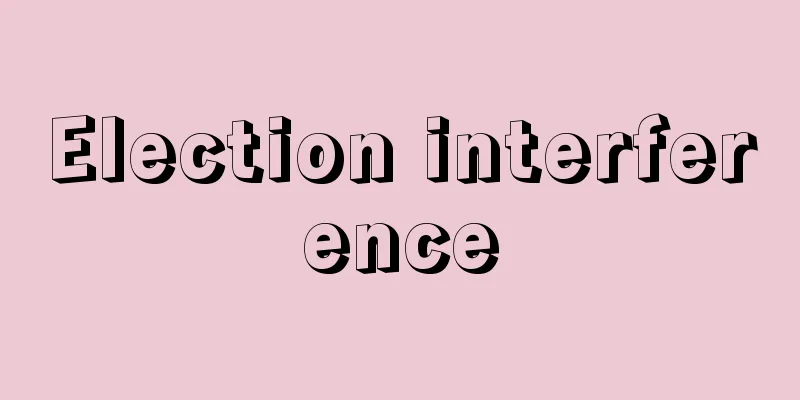Election interference

|
It refers to direct interference by public authorities in the election campaigns of political opponents, but in a broader sense it also includes indirect interference that guides the people's will in a certain direction in advance in elections. In the first place, free and fair election campaigns must be guaranteed as a prerequisite for voters to form their own will in elections. This means that in elections, the ruling party and the opposition party should compete fairly on an equal footing. However, historically in various countries, the ruling party has often used government power such as bureaucrats, police, and the military to openly interfere with the election campaigns of the opposition party in order to give its own party candidate an advantage. Famous examples of large-scale election interference in Japan include the massive interference by Home Minister Shinagawa Yajiro and others against Democratic Party candidates in the second general election in 1892 (Meiji 25) (25 dead and 388 injured in clashes with the police), the election disruption by Home Minister Oura Kanetake and others in the 12th general election in 1915 (Taisho 4), and the interference by Home Minister Suzuki Kisaburo in the 16th general election in 1928 (Showa 3). Direct violent intervention has become less common in modern times, but election interference in a broad sense does occur, such as inducement of benefits through government subsidies and the use of the mass media to manipulate public opinion. [Ryōshi Mitsuhashi] Source: Shogakukan Encyclopedia Nipponica About Encyclopedia Nipponica Information | Legend |
|
公権力による政治的反対派の選挙運動に対する直接的な妨害活動をいうが、広義には、選挙において国民の意思選択をあらかじめ一定の方向に誘導する間接的干渉も含む。そもそも選挙において選挙民が主体的に意思形成する前提条件として、自由で公正な選挙運動が保障されていなければならない。このことは、選挙においては政権党も反対党も対等な関係で公正に競い合うべきことを意味する。ところが歴史的には各国において政権党が自党候補の当選を有利にするため官僚・警察・軍隊などの政府権力を用いて反対党の選挙運動に対してむき出しの妨害をすることがしばしばあった。日本での大規模な選挙干渉としては1892年(明治25)の第2回総選挙における内務大臣品川弥二郎らによる民党派候補に対する大干渉(警察隊との衝突による死者25人、負傷者388人)、1915年(大正4)第12回総選挙における内務大臣大浦兼武(おおうらかねたけ)らによる選挙妨害、28年(昭和3)の第16回総選挙における内務大臣鈴木喜三郎(きさぶろう)による干渉などが有名。現代では直接的暴力的な介入は少なくなったが、政府補助金等による利益誘導、マスコミを利用しての世論誘導など、広義の選挙干渉が行われることはある。 [三橋良士明] 出典 小学館 日本大百科全書(ニッポニカ)日本大百科全書(ニッポニカ)について 情報 | 凡例 |
<<: Election Administration Committee - Election Administration Committee
>>: Election campaign - English
Recommend
Emperor Kumazawa
In the 1940s, Kumazawa claimed to be the heir to t...
Buffer solution - Kanshoeki
A solution that has the property of mitigating th...
PhotoSetter
...Drawbacks of phototypesetting include the fact...
Legionnaires' disease
Legionella pneumophila is a type of bacterial pne...
Motonori Mori
Year of death: December 23, 1896 (Meiji 29) Year o...
Radhakrishnan - Sarvepalli Radhakrishnan
Indian politician and philosopher. Born in South ...
Breviceps
…They lay eggs all year round, in puddles created...
Acute enteritis - Kyuseichoen
...However, as mentioned above, clinically there ...
Batrachuperus
...After metamorphosis, they develop lungs and mo...
Yusuhara Hachiman Shrine
It is also called "Isuhara-ji". It is l...
American Bar Association
...The reason for this system is that it is desir...
fabula praetexta (English spelling) fabula praetexta
…Ennius' nephews, Marcus Pacuvius (c. 220-130...
Political system
A theoretical model that treats political phenomen...
Porridge test - Kayudameshi
...On the night of January 15th, a bowl of rice p...
Mayflower Compact
Also known as the Mayflower Compact, it is a contr...









